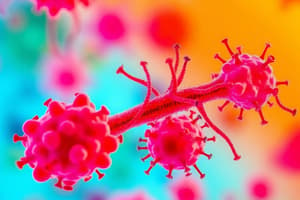Podcast
Questions and Answers
What does the term 'isolation' refer to in microbiology?
What does the term 'isolation' refer to in microbiology?
- Separation of a strain from a natural, mixed population of living microbes (correct)
- Creating a pure culture from a single microbial species
- Studying the interaction between different microbial populations
- Enhancing the growth of multiple microbial species in a controlled environment
What does the serial dilution method help in obtaining?
What does the serial dilution method help in obtaining?
- A pure culture without dilution
- A more diverse microbial population
- A higher concentration of cells in a culture
- Isolated colonies with reduced crowding (correct)
What is the purpose of performing serial dilutions when isolating microorganisms from soil?
What is the purpose of performing serial dilutions when isolating microorganisms from soil?
- To enhance the growth of all microorganisms present
- To maintain a high concentration of microorganisms
- To increase the chance of separating a mixture (correct)
- To decrease the chance of separating different strains
What types of microorganisms are commonly found in soil samples?
What types of microorganisms are commonly found in soil samples?
Where is the soil sample collected from before performing serial dilution?
Where is the soil sample collected from before performing serial dilution?
Flashcards are hidden until you start studying
Study Notes
Microbiology and Isolation
- In microbiology, isolation refers to the process of separating and growing a specific microorganism in a controlled environment, such as a laboratory, to study its characteristics and properties.
Serial Dilution Method
- The serial dilution method helps in obtaining a diluted suspension of microorganisms, allowing for the isolation of individual microorganisms or colonies.
- Serial dilution involves repeatedly diluting a sample of microorganisms with a sterile solution, resulting in a series of decreasing concentrations of microorganisms.
Purpose of Serial Dilution in Soil Microbiology
- The purpose of performing serial dilutions when isolating microorganisms from soil is to reduce the number of microorganisms in the sample, enabling the growth of individual colonies on a culture medium.
- This process helps to identify and characterize the different microorganisms present in the soil sample.
Microorganisms Found in Soil
- Soil samples often contain a diverse range of microorganisms, including bacteria, fungi, protozoa, and nematodes.
- These microorganisms play important roles in soil ecosystems, such as decomposition, nutrient cycling, and plant-microbe interactions.
Soil Sample Collection
- Soil samples are typically collected from the surface layer of the soil, usually up to a depth of 10-15 cm, before performing serial dilution.
- The sampling site may vary depending on the research question or objective, but often includes areas with diverse soil types, vegetation, or land use patterns.
Studying That Suits You
Use AI to generate personalized quizzes and flashcards to suit your learning preferences.




